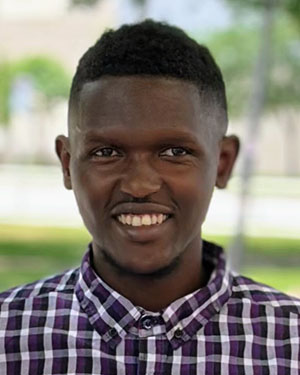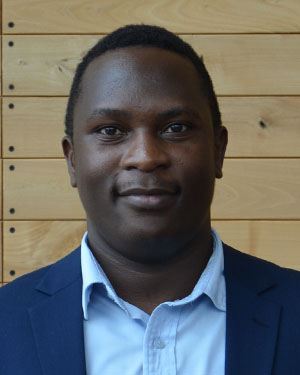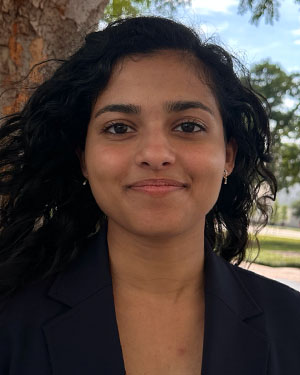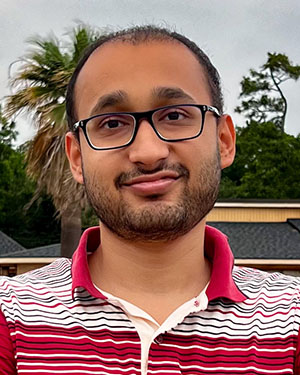Scholarships Promote Research in High Temperature Superconductivity and Related Energy Materials
Four Physics Ph.D. students were awarded scholarships for the 2024-2025 academic year from the Texas Center for Superconductivity at the University of Houston (TcSUH).
The scholarships, awarded to graduate students working with or advised by TcSUH-affiliated faculty members, are based on merit and reward outstanding academic and research progress. They are intended to promote TcSUH research programs in high temperature superconductivity and related energy materials.
Professor Zhifeng Ren, Paul C.W. Chu and May P. Chern Endowed Chair in Condensed Matter Physics and director of TcSUH, said the pool of applicants for this cycle was outstanding and the Scholarship Committee found it difficult to choose the final recipients.
Recipients will discuss their research projects on September 13 at TcSUH’s Fall Welcome and Scholarship Symposium.
C. W. Chu Scholarship
Thacien Habamahoro

Advisor: Paul Chu
Habamahoro obtained his Bachelor of Science in physics with honors from the University
of Rwanda. Subsequently, he pursued a master’s degree in theoretical physics at the
ICTP-East African Institute of Fundamental Research. Inspired by the outstanding research
of UH’s scholars, he enrolled in the physics Ph.D. program at UH. He has been actively
involved in experimental research on superconductors and related novel materials at
TcSUH. Habamahoro’s current research explores superconductivity in-Ruddlesden-Popper
nickelate phases. He aims to achieve ambient-pressure superconductivity using chemical
doping or pressure quenching techniques recently developed in the Chu lab. Habamahoro
is determined to make significant contributions to the field of superconductivity.
Cora Hawley Scholarships
Paul Byaruhanga

Advisor: Shuo Chen
A graduate of Makerere University, Byaruhanga transitioned to advanced research in
experimental physics after an inspiring stint at the ICTP-East African Institute for
Fundamental Research, specializing in condensed matter physics. His academic journey
took a pivotal turn when he learned about the pioneering work at TcSUH, sparking a
deep interest in exploring new frontiers in the field. With a solid theoretical background,
Byaruhanga was driven by a desire to immerse himself in experimental approaches, aiming
to contribute innovative solutions and deepen his understanding of physical phenomena.
His current research activities reflect his commitment to pushing the boundaries of
knowledge in physics, combining rigorous analysis with practical experimentation to
uncover new insights into electrode materials for hydrogen applications.
Navmi Naik

Advisor: Zhifeng Ren
Naik received her Bachelor of Science and Master of Science in physics from Mahatma
Gandhi University, Kerala, India. Her journey into research gained momentum during
an impactful internship at the Indian Institute of Technology, inspiring her to pursue
a Ph.D. pursuit in physics at UH. Currently, Naik focuses her research on developing
efficient bifunctional catalysts for water electrolysis, which is vital for sustainable
energy solutions. Beyond her academic pursuits, she actively engages in leadership
roles, serving as vice chair of student org relations at the Energy Coalition and
as treasurer for the Women in Physics Society. Naik advocates for collaboration and
diversity within STEM in these capacities, striving to foster a positive impact on
scientific innovation and inclusivity efforts.
Swadeepan Nanda

Advisor: Pavan Hosur
Nanda received his Bachelor of Science and Master of Science in physics from the Indian
Institute of Science Education and Research, Bhopal. Throughout his academic journey,
he developed a strong passion for theoretical physics, particularly at the intersection
of high energy physics and condensed matter theory, which led him to pursue research
in the UH Department of Physics. Currently, his research focuses on superconductor
vortices in novel topological phases of matter. He believes this area of study holds
significant potential for breakthroughs in topological quantum computation. Looking
ahead, he is eager to delve deeper into the application of superconductor vortices
in quantum computation.